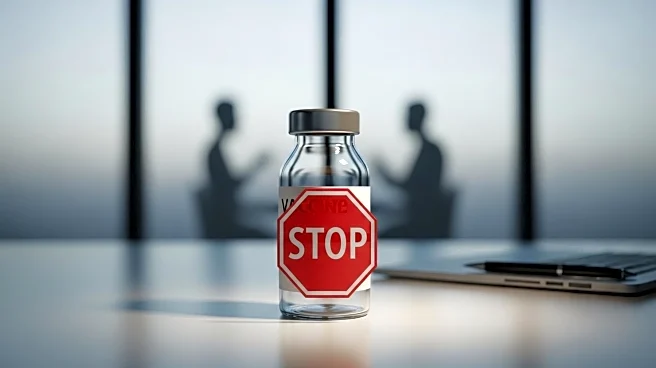What is the story about?
What's Happening?
President Donald Trump and Health Secretary Robert F. Kennedy Jr. are reportedly contemplating a ban on COVID-19 vaccines in the United States within months. This development follows a report from the Daily Beast, which cites Aseem Malhotra, a British cardiologist and adviser to the Make America Healthy Again Action. Malhotra claims that individuals close to Kennedy are questioning the continued administration of the vaccine, and several members of Trump's family share skepticism about its safety. The potential withdrawal of the vaccine could occur in stages, possibly involving a review of vaccine safety data. Despite these discussions, the White House has stated that any talk of policy changes should be considered speculative unless officially announced by the administration. Kennedy has previously altered Health and Human Services (HHS) policies, including removing routine COVID-19 vaccination recommendations for certain groups from CDC guidelines and reforming the CDC's Advisory Committee on Immunization Practices.
Why It's Important?
The consideration of a ban on COVID-19 vaccines by high-profile figures like President Trump and Robert F. Kennedy Jr. could have significant implications for public health policy in the United States. Such a move may affect vaccine distribution and public trust in health authorities, potentially leading to decreased vaccination rates and increased vulnerability to COVID-19 outbreaks. The skepticism surrounding vaccine safety, if not addressed with clear scientific evidence, could undermine efforts to control the pandemic and protect vulnerable populations. Additionally, the actions taken by Kennedy, such as reforming advisory committees and canceling contracts related to mRNA vaccine research, indicate a shift in the government's approach to vaccine policy, which may face resistance from medical organizations advocating for widespread vaccination.
What's Next?
If the administration proceeds with the ban, it could lead to significant changes in public health strategy and vaccine availability. Stakeholders such as healthcare providers, pharmaceutical companies, and public health organizations may respond with opposition or seek legal avenues to challenge the decision. The American Academy of Pediatrics, for instance, continues to recommend COVID-19 vaccines for children, contradicting recent CDC guidelines. The administration's next steps will likely involve further evaluation of vaccine safety data and potential policy announcements. Public and political reactions will be crucial in shaping the future of COVID-19 vaccination efforts in the country.
Beyond the Headlines
The potential ban on COVID-19 vaccines raises ethical and legal questions about government intervention in public health decisions. It highlights the tension between individual rights and collective health responsibilities, as well as the influence of political figures on scientific policy. Long-term implications could include shifts in public trust in health institutions and changes in how vaccine safety is communicated and regulated. The debate may also impact international perceptions of U.S. health policy and its role in global pandemic response efforts.















